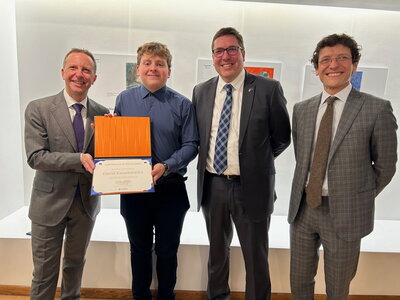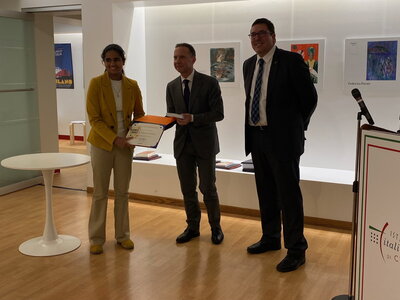On Dec. 8, 2023, Illinois high school students who were awarded first place or honorable mention in the 2023-24 High School Translation Competition gathered at the Italian Cultural Institute in Chicago to celebrate their achievement. The event was sponsored by the European Union Center, a member of the Illinois Global Institute, and welcomed Thomas Botzios, Consul General of Italy in Chicago.
Information about the competition, including eligibility, rules, judging, and awards, can be found on the EUC website, and a list of awardees in the six languages (Greek, Hebrew, Italian, Polish, Swedish, and Ukranian) here.
Students interested in participating in the next competition should check the EUC website in fall 2024.
After the competition, David Ksiazkiewicz, winner in the Polish category and student at Niles North High School in Skokie, and Maya Viswanathan, winner in the Hebrew category and student at University Laboratory High School in Urbana, answered a few questions about their experience with foreign language education.
David Ksiazkiewicz

How long have you studied Polish, and how would you rate your fluency? For example, how well do you speak, read, or write Polish?
I’ve spoken Polish since birth. My parents, both immigrants, have spoken progressively better English over the years, but there was no doubt I would be speaking Polish at home. I began attending a Polish School in Niles from the time I was 3-years-old--learning speaking, reading, writing, culture, and religion. Although a majority of my learning to speak was at home, practically everything else was at school, and I credit those weekly classes for helping me excel at all aspects of the language.
Why did you choose Polish as your language to study?
Family is the key factor. My parents wanted the culture to live on in our family. Other factors included communication with family that still lives in Poland, possible benefits in the working world later on, and a sense of community among Polish peers, but especially in the early years, it was my family that pushed me to keep studying.
Do you think your knowledge of Polish will play a part in your future academic or professional choices?
As of now, I’m not sure of what the future holds for me, but especially if I stay in the Chicagoland area, speaking Polish can only be a good skill to possess. The idea of studying abroad crosses my mind occasionally, but it’s not likely in my cards. Whichever route I end up taking, however, having a second language on my resumé is sure to help me succeed.
Do you know any other foreign languages? Do you plan on studying any in the future?
Outside of some basic Spanish skills, it’s just Polish and English. I wasn’t a huge fan of the Spanish curriculum at school, and I felt that it would be more beneficial to take other classes more related to my interests, so I stopped my sophomore year. I will say that if I have the time in my life, I’d love to keep learning through an alternate source, and eventually know enough Spanish to communicate at a basic level.
What reasons would you provide other high school students who were thinking of taking a foreign language?
Language is the entryway into experiences, into cultures, into a life not previously known. For the sake of understanding and connecting with other people, for traveling around the world, or even something as simple as challenging your mind, knowing foreign languages is beneficial.
Is there anything else you would like me to know on the topic of foreign language study?
It’s worth it. Even though I had to make sacrifices to attend a Polish school, and engage in initially tough conversations with family where I couldn’t even pronounce our last name, the relationships I formed, personal growth I experienced, and my ability to continue our generations-long customs make it infinitely worth it to learn Polish.
Maya Viswanathan

How long have you studied Hebrew, and how would you rate your fluency? For example, how well do you speak, read, or write Hebrew?
I’ve been learning Hebrew since I was 5-years-old. Although I didn’t grow up in a Hebrew-speaking home, my mom and grandparents would speak it to each other, and I started picking it up from them. Afterwards, I started doing more to learn it, by watching a lot of children’s TV, reading books, and practicing writing. I’m pretty fluent, but my Hebrew isn’t as good as my English.
Why did you choose Hebrew as your language to study?
I have a lot of family that speaks Hebrew, and so I wanted to study Hebrew to be able to communicate with cousins who don’t speak English, as well as connect with and understand my culture. Learning Hebrew has allowed me to watch a lot of documentaries that don’t have English subtitles and has provided a window into the subtleties of life in Israel. It’s also helpful for understanding a lot of texts I’ve encountered in Hebrew: both books and religious texts like prayers or the Bible.
Do you think your knowledge of Hebrew will play a part in your future academic or professional choices?
Right now, I’d like to study something related to math and computer science. I don’t know if I plan to do something more related to Hebrew, but in any field, my being able to communicate with and understand more people, other than those who speak English, would be really helpful. Beyond that, I definitely plan to continue studying and reading Hebrew, as well as watching movies/TV in Hebrew to learn more even if that’s not my main job.
Do you know any other foreign languages? Do you plan on studying any in the future?
I’ve been learning Yiddish, for which Hebrew is really helpful since many Yiddish words come from Hebrew. I’ve also been learning Hindi and Spanish. In school, I’ve taken German for four years, and this year I started taking Latin. I really enjoy learning languages and want to continue doing so. Tamil is next on my list of languages I want to learn.
What reasons would you provide other high school students who were thinking of taking a foreign language?
I think it’s a lot of fun. It opens up a lot of new opportunities, both in terms of resources you can access and people you can connect with. I also think it’s cool to learn the words, and I think it helps you understand English better by seeing how it differs from other languages.
Is there anything else you would like me to know on the topic of foreign language study?
Speaking and even writing is very different from translating, which we had to do for the competition. It’s hard to know how to translate cultural references or specific words or ways of phrasing something. I’d never really tried to translate from Hebrew before, and I enjoyed playing around with the translation and using it to really improve my understanding of Hebrew!